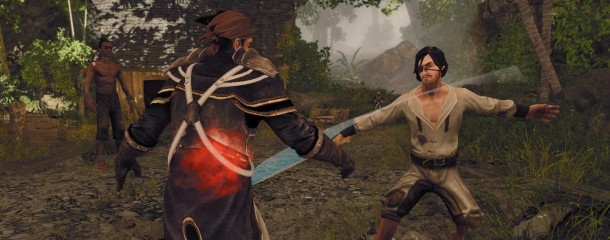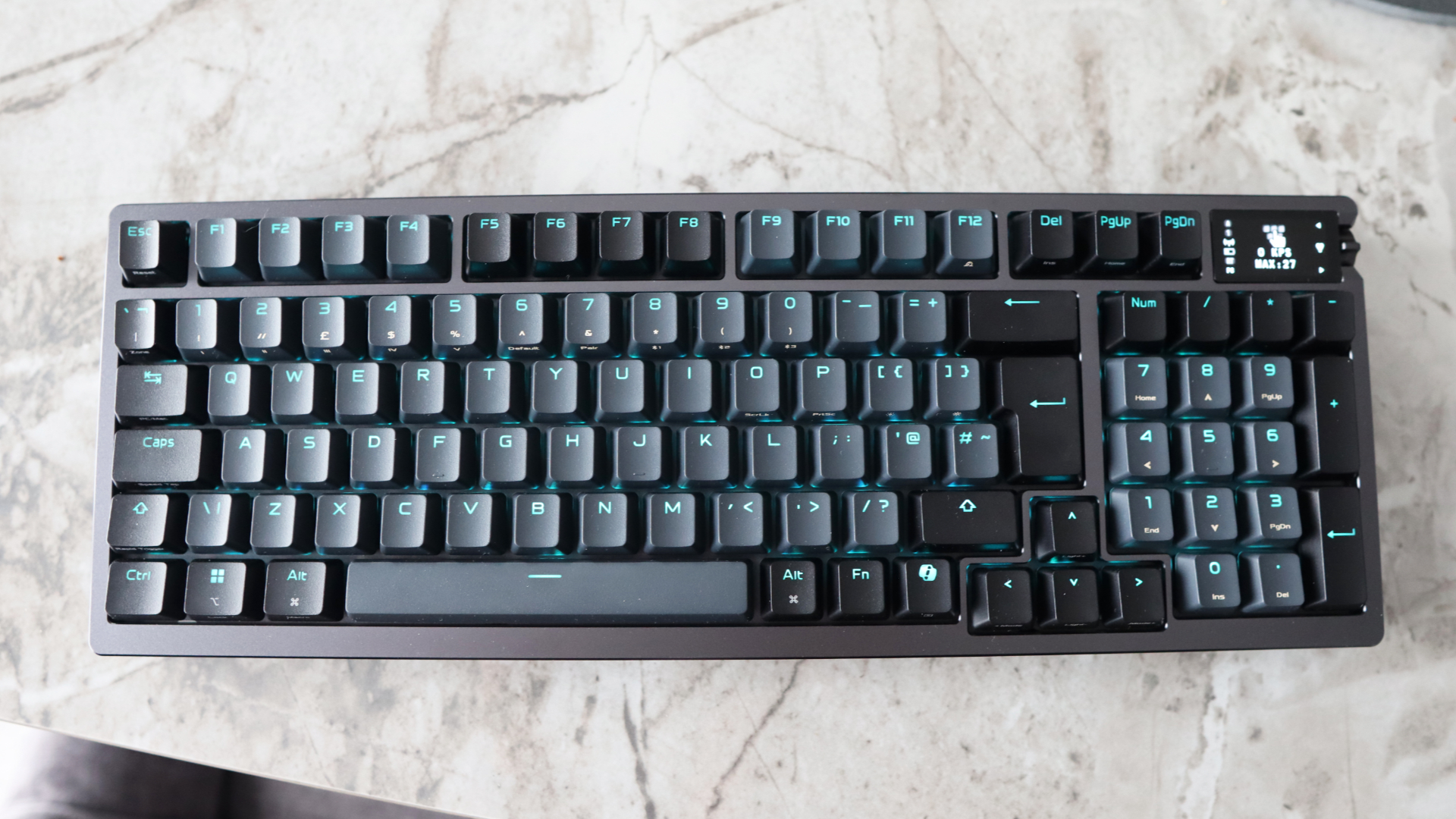Our Verdict
Clunky quest structure and uninteresting main characters shoot this weirdly compulsive RPG in the foot.
PC Gamer's got your back
Risen 2 has the best jumping animation in all of gaming. Press space and your plumvoiced pirate raises one leg and skips forward. Not only is it the cutest thing I've ever seen done by a hairy man in shorts (and I've seen Graham play badminton), but it moves Risen 2's nameless hero around faster than walking.
I spent most of the game cheerfully skipping between proclamations of doom, this being an RPG set on a group of islands on the frontline in the battle against sea-dwelling godmonstrosities called the Titans.
Risen 2 assumes more than a passing familiarity with the events of the middling-quality first game. The supporting cast don't do a lot to assist the bewildered, dropping names before you've met the character in question, and assuming perfect recollection of a mess of mythology that was barely explained the first time around.
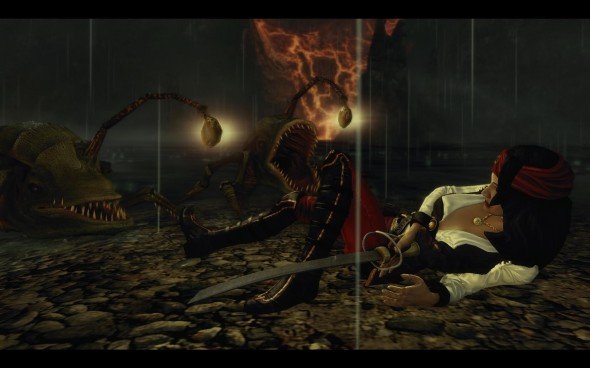
That mythology is pirate cliché, all bottles of grog and pilfering parrots, but viewed through the weird, distorting lens of Risen's Germanic origins. Five hours in, I came across pirates loyal to the antagonistic captain Crow. We traded words, the conversation dominated by my party member captain Steelbeard. After a short fight, companion Patty admonished me for starting the ruckus. I protested my innocence; she responded with the baffling “sure, if you were five years old!”
Risen 2 is also anachronistic – bordering on racist and sexist – in its portrayal of women and the island's indigenous tribes. Patty is forced to work in a kitchen early on in the story, because – as your nameless hero asserts – she is a woman, after all. Attempts to protest and present the section as social commentary are undercut when you're made to pressgang her into service in order to advance the story. Local tribes, too, are treated like characters from an early Tintin adventure. They spout nonsense words, practice voodoo, wear very few clothes, and are most commonly referred to as 'savages.' It doesn't feel like the game sets out to be malicious, but the tone sat uneasily with me at a few junctures.
At other times, Risen 2 is downright endearing. The voice actors are trying so hard to deliver accurate intonations and inflections that the result succeeds despite the grammatical insanity of the script. If nothing else, I spent most of my time distracted by the exuberant animation: lines are accompanied by over-gesticulation that would make a Power Ranger wince.
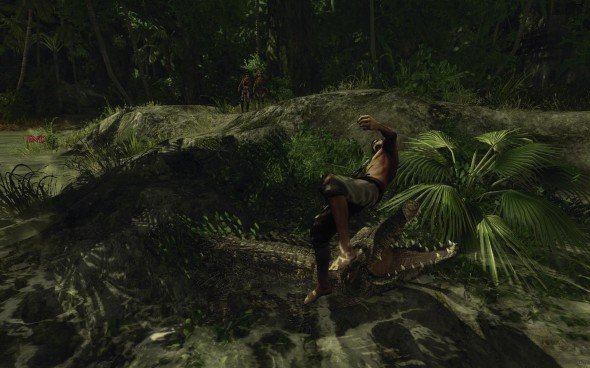
The frequency with which voice actors are reused can also be hilarious, when it isn't just incredibly grating. Speak to the lone guard of a storeroom in the first port you visit, and he'll give you a fetch quest in the Queen's English. Complete it, and he'll hand over your reward in the same cut-glass tones. But speak to him once more, his role as questgiver over, and he'll cough out “NO, NOT RIGHT NOW” with the voice of an anthropomorphised frog.
Keep up to date with the most important stories and the best deals, as picked by the PC Gamer team.
Fetch quests are endemic to Risen 2. The store-guarding frog man of that example asked me to collect six smashed boxes washed up on a beach from a wreck, to recover the most important parts of the ship. I stepped over perfectly useful anchors and oars in order to collect all six boxes, each as arbitrary and seemingly useless as the last. Filler quests don't get much more thrilling as the game goes on, either. Mooching around a tribal village, I was asked by a woman stirring a pot to collect offerings for a festival from four people. Three of those people stood no less than ten paces away from her. The fourth was 30 seconds up the road. Whatever was in that pot, it must have been incredibly important.
A number of quests demand you follow someone to somewhere. But their AI is idiotic: the computer sprints its charges into contact with streams of enemies. Half of your part-time companions have the decency to fight back, making the battle into a team fight, but the other half cower in a corner as you're called in to protect them from tribal warriors, jaguars, or particularly miffed pigs. Your cowardly friends are rarely in serious danger of death, but they will attract the attention of the fauna of these lush islands, before directing it straight onto you.
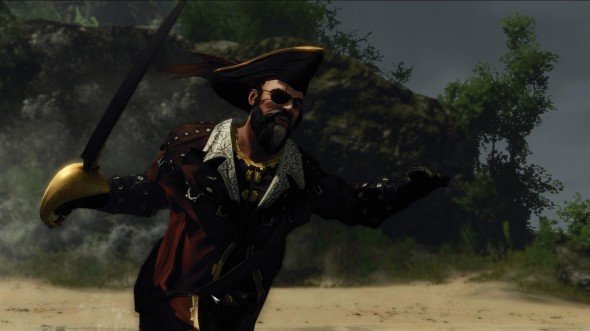
In Risen 2, that's a problem. Other RPGs offer a steady stream of loot and level ups. Risen's system means players don't choose character or class, instead plugging experience points into advancing their learning in one of five fields (see the boxout on the previous page). Levelling up one section unlocks the ability to gain new skills, but these have to be explained to you by trainers for wallet-scaringly huge sums of money. It costs a thousand gold to learn how to pick locks – even with a lockpick in hand – when most early to mid-game quests pay out around a hundred gold on completion. Budget badly – or just get distracted by an interesting and expensive talent – and you'll be left not only out of pocket, but your progress stymied in several quest areas.
The game's five key attributes are levelled up with 'glory'. Complete a quest and you'll be showered in the stuff, but being awarded ten glorious glory for 'discovering' a beach ten feet from a bustling town proves that it's just an overly grand name for 'experience points'. Choosing to level one attribute increases its price in glory, making it tougher for players who want to truly specialise. I set out to make my nameless hero the savviest pirate in piratedom, turbo-charging his 'cunning' attribute above all others. But before long the cost of each extra level was too rich for my inglorious bastard, and I was finding even the smallest and cutest of foes would rip through my weak-wristed defence. I was forced to shunt some glory I'd been saving into the 'toughness' part of the character sheet.
On the plus side, my focus on cunning had given me an area of expertise. I spoke to trainers and unlocked talents in both pickpocketing and speech, letting me talk my way into an early pirate camp without turgid fetch-questing, keeping my pockets lined with small influxes of gold from unsuspecting dupes along the way. This is Risen 2 at its best: even though the game lacks defined classes and has no real choice in terms of action or dialogue, by restricting cash flow and glory payout, players have to make their meagre holdings work for them. I spent most of the first ten hours of the game nearly naked, having deemed clothes to be an irrelevant, expensive frippery that squandered cash best saved for learning stuff from trainers.
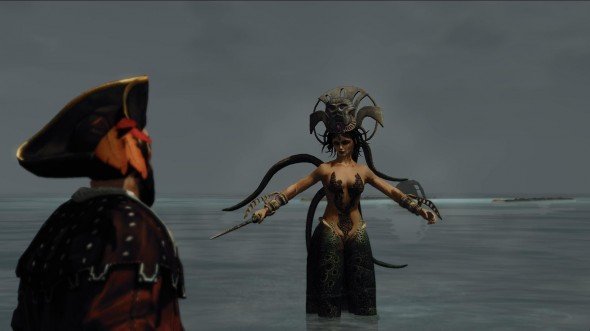
I came to regret that decision later, as the enemies I was put up against increased in nastiness. Risen 2's combat is fiddly: targeting changes without obvious warning, and you'll find yourself slashing the wrong monkey [not a euphemism – Euphemism Ed] during heated battles. Swords are your main weapon, guns unleash a chunk of damage but have a reload time spanning tens of seconds. Level up your 'blades' attribute and swordfights are easier, but combat lacks finesse. Land a hit on a weaker foe and it's easy enough to keep slashing until they drop. Some tougher enemies play more tactically – fight another human and you'll have to wait for their guard to falter before pressing in – but others feel unfair in their attack patterns. I was asked to kill a crocodile for some villagers. The beast was orders-ofmagnitude more powerful than anything I'd faced before, and, crucially, my parry ability had no effect on its crushing jaws. This was canonically correct – crocodiles aren't usually big on honourable duels – but the fight felt unfair and restricted my progress, as I had to grind around the area to make my character less flimsy.
Risen 2 is as coarsely put together as the pirates it references throughout. Dig around and there's real gold to be found in the hours of game-time it offers, but the sheer hard work required to unearth them will be too much for all but the truly dedicated RPG plunderer.
A pirate's life for ye? That depends on your tolerance for working for your treasure.
Clunky quest structure and uninteresting main characters shoot this weirdly compulsive RPG in the foot.
